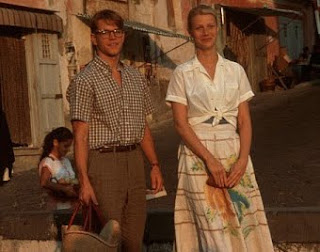I’ve never read the novel on which The Talented Mr. Ripley is based; however it’s one of those rare instances on the internet where I’ve heard fans convinced that the adaptation was better than the original. I’m a prejudicial fan of Anthony Minghella, I’d be hard-pressed to say that each of his films has been a masterpiece; but I’d also be hard-pressed to trash them either. Minghella is just one of the directors [along with Lean, Scorsese, Cukor and a few others] that work for me, and whom I defend regardless. The Talented Mr. Ripley was released three years after Minghella’s amazingly successful The English Patient, and even if preference would entice you more to Ripley, we could hardly have expected lightning to strike twice as far as critics and the Academy were concerned. We could not expect it to be as massively successful as its predecessor, and it wasn’t. After spotty appearances at precursors it earned four Oscar nominations [Screenplay, Art Direction, Supporting Actor and Score]. It won none. But to look at The Talented Mr. Ripley from this excessively superficial stance belies the beauty and the maturity with which the film is made, and though it’s not my favourite Minghella film I do believe it’s his most accessible.
Tom Ripley is the protagonist of the story, protagonist he may be but not the hero. He is a young man of mean circumstances who upon chance is thrust into a world that begins dangerously enticing to him. It is the world of Dickie Greenleaf – a charismatic youngster – who ranges from Tom’s tyrant, his best friend and perhaps even the object of his affection. We can’t be too sure. It’s up to Matt Damon and Jude Law to promulgate this relationship. Matt must play a variation on a role he continued in the Oceans’ series. He must be a man who is charming enough but fails to make a lasting impression you, a man with his back against the wall who sees the most ridiculous of all means of escape. And Jude is a man who has lived his life in such luxury that he fails to realise just how desperate some are to enter it.

As good as this film is, and it is good, it seems that the scenes with Matt and Jude are just very well done. Two scenes with them come to mind immediately. The first is early on, Ripley takes off his spectacles and Dickie says, without the slightest trace of callousness “You know, without the glasses you’re not even ugly.” It’s a cold moment, and I don’t think even Dickie realises the meanness of this statement. It’s as if it’s already been ordained, Ripley is unattractive and definitely beneath Dickie…that much is certain. The second is later and much more chilling. On a train ride, Dickie lies sleeping as Tom sinisterly watches over him. He motions as if to caress Dickie and almost as if this were some psychological thriller [and who’s to say it’s not] Dickie wakes up right then, oblivious it would seem, though I’m not sure. He looks at Tom weirdly, “Why do you do that thing - with your neck. On trains you always do that thing, it's spooky.” I love Jude’s delivery, but Matt’s reaction too is a gem.
But the way I’m gushing, you’d think that only these two gentlemen lend their talent to the film; and that couldn’t be more inaccurate. One thing Minghella has been known for is his casts of good but not always overly popular actors. In addition to Matt Damon and Jude Law, Cate Blanchett, Gwyneth Palthrow, Philip Seymour Hoffman and Jack Davenport lend their services – and each in their own way is effective in their roles. I singled out Cate, a few months back, as a potential candidate for a
Supporting Actress Nominee in 1999. Her Meredith should be the thinnest character but her little acting idiosyncrasies
make a true character that's better than she's given credit for. Gwyneth Palthrow’s Marge has been unfairly treated as time goes by. She’s taxed with more than just looking pretty. She plays Marge with a bit of gumption that just may have been residual from
Viola De Lesseps; and it works. I’m still not convinced that her confrontation with Tom towards the end of the film is the right choice, but whenever I’m tempted to doubt her shrillness I remember that this is exactly how Marge would have behaved, and I acquiesce.
The Talented Mr. Ripley always made me wish that Minghella could have tackled some Hitchockian drama and done his worst with it. It’s not that this film is so frightening, but it’s that final scene that is so unnerving that it always leaves me with my insides a little upset. As we hear Tom kill Peter and listen to his sickening crying you can’t help but sympathise. It’s what makes The Talented Mr. Ripley such an uncharacteristic film. The prototypical villain does not end up dead, but then there is not a single character in the film – save for Meredith, and maybe not even her – who does not act solely for themselves. This movie should be seen for much – Minghella’s superb direction, the astounding technical achievements, the excellent performances of the cast – Hoffman, Blanchett, Palthrow, the amazing Jude Law and Matt Damon in the greatest thing I’ve ever seen him do. This film should not be missed. That’s why it’s my #54.




